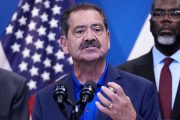
New York City Mayor Bill de Blasio has urged employers to be as assertive as possible in mandating that workers get vaccinated against COVID-19, marking the latest sign the U.S. jab campaign is shifting its tactics from cajoling to forcing.
“I’m calling on all New York City employers, including our private hospitals, to move immediately to some form of mandate,” de Blasio said Friday in a radio interview on The Brian Lehrer Show. He called on employers to impose “whatever the maximum is you feel you can do. It will move the ball. It will get more people vaccinated.” He even added that the mandates “will change the consciousness [of unvaccinated],” possibly implying that the coercion and the threat of getting fired will make people more eager to roll up their sleeves.
De Blasio spoke about his recent policy requiring all public healthcare workers to get vaccinated against COVID-19 or be tested weekly. De Blasio said he expects that over time the weekly testing will become “tiresome,” and employees will opt to get a shot. And if the healthcare workers de Blasio referred to as “heroes,” whom “we love,” reject the new rules, they will be suspended without pay. The host noted that about 40 percent of healthcare workers remain unvaccinated, and “most of the workers don’t like the mandate, obviously.”
The mayor was asked about the initiative introduced in San Francisco that will mandate all its city workers, about 35,000 people, to get a jab. De Blasio praised San Francisco Mayor London Breed as one of the “great national leaders on COVID,” and pledged to do even “more,” and “soon.” He said “our goal is to be very aggressive,” since the city “has a lot more people to deal with,” and expressed his belief that many other cities and localities will follow the example of San Francisco and New York – “because the key is vaccination.” The mayor then echoed a false claim of the CDC Director Rochelle Walensky and President Joe Biden that this is a “pandemic of unvaccinated,” and that if “everyone” has gotten a jab, “we wouldn’t be having a conversation about the Delta variant.” In order to “reach people,” the mayor said, the private hospitals and other types of businesses need to impose “some kind of mandate,” which, the mayor believes, would “actually save us.”
Lehrer asked de Blasio if it was fair to assume the mayor is setting up public opinion for more of the mandates that are yet to be announced, to which de Blasio answered, “Draw your own conclusions.” When followed up with a question about the possible mandatory vaccination of the city agencies such as the police department, in which less than half of the officers are inoculated, de Blasio stated, “I’ve been very explicit about the fact that this is the beginning and we’re going to climb up the ladder of measures to address this situation…. We’re going to be making announcements piece by piece.”
De Blasio specifically underlined a need to toughen up on getting more people inoculated. He described how the city “went the extra mile” and tried “every form of incentive,” and possibly went further than any other city in terms of outreach and grassroots campaigning to popularize vaccination — New Yorkers can now even get a vaccine delivered directly to their doors, the mayor advertised. All of these measures “still matter,” the mayor said, and cheered that it made the city get five million of its residents jabbed, but now it becomes obvious that the “limits of a purely voluntary system” had been reached. Therefore, de Blasio continued, “It is time for more mandates,” added later, “the more the better.”
An incentive behind this aggressive push, ironically, was attributed to “freedom,” more jobs, and a return to normal life. De Blasio did not explain the contradiction between forcing people to get experimental gene therapy and their freedom, which includes an inalienable right to bodily autonomy.
Finally, de Blasio was asked about the recent announcement of French President Emmanuel Macron that the French government will now require people to show a “COVID pass” — a proof of vaccination — to board a long-distance public transportation or attend public events. Mayor de Blasio did not rule out the possibility of following a similar path. “I’m not always the biggest Macron fan, but in this case, I think that’s a direction we need to seriously consider — I think there’s a lot to be said for that,” de Blasio said.
“We’re in a good position because we laid down that heavy foundation of vaccination,” he added, “and we can make it through and we can continue to recover if we, you know, rapidly address this situation, and that’s where I want to see more aggressive and more creative approaches. And it’s all about vaccination. We can talk about anything else, I’m happy to, but the ball game is vaccination.”
Reportedly, 75 percent percent of New York adults have received at least their first vaccine dose, which is above the 69 percent national rate. At the same time, some city agencies, such as the aforementioned police department, as well as the fire department and public schools, have 65 percent of their staff vaccinated — a number, apparently, concerning the city officials.
Kathryn Wylde, president of the Partnership for New York City, a major business group, said about a quarter of the companies that her group had surveyed said they were requiring vaccinations for workers returning to the office. Others are offering regular testing and incentives for those who are not vaccinated.
Wylde further emphasized employers believed it would be difficult and burdensome for them to require vaccination on their own, since they would have to navigate the complexities and legal liabilities related to “policing their workers’ vaccination status.” She noted that it is the federal government that should make the call and issue “some form of a vaccine mandate” — a move that the Biden administration has been avoiding, shifting responsibility onto local authorities and businesses.
Dr. Anthony Fauci, Biden’s chief medical advisor, and Andy Slavitt, a former COVID-19 advisor to the administration, are among those who have suggested employers and local governments use mandates to get needles in more arms.





